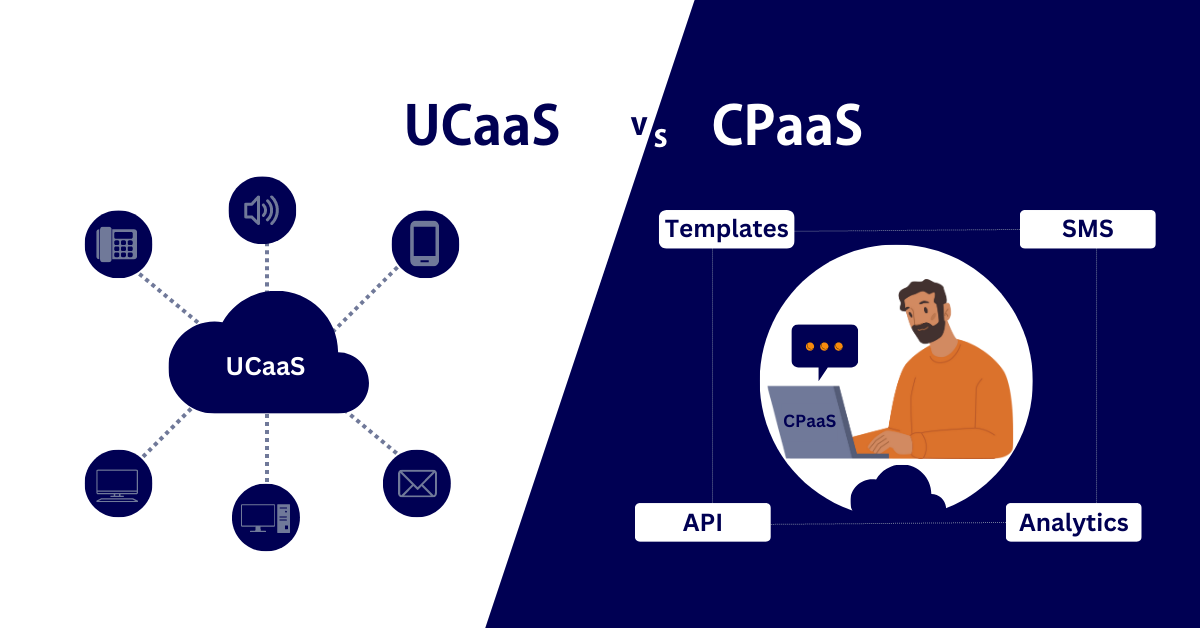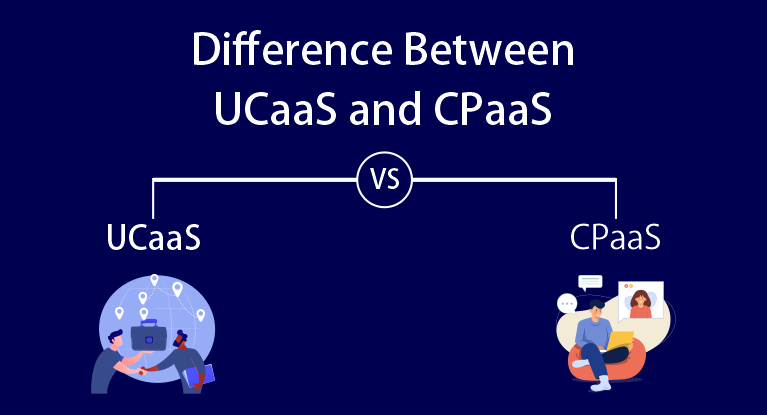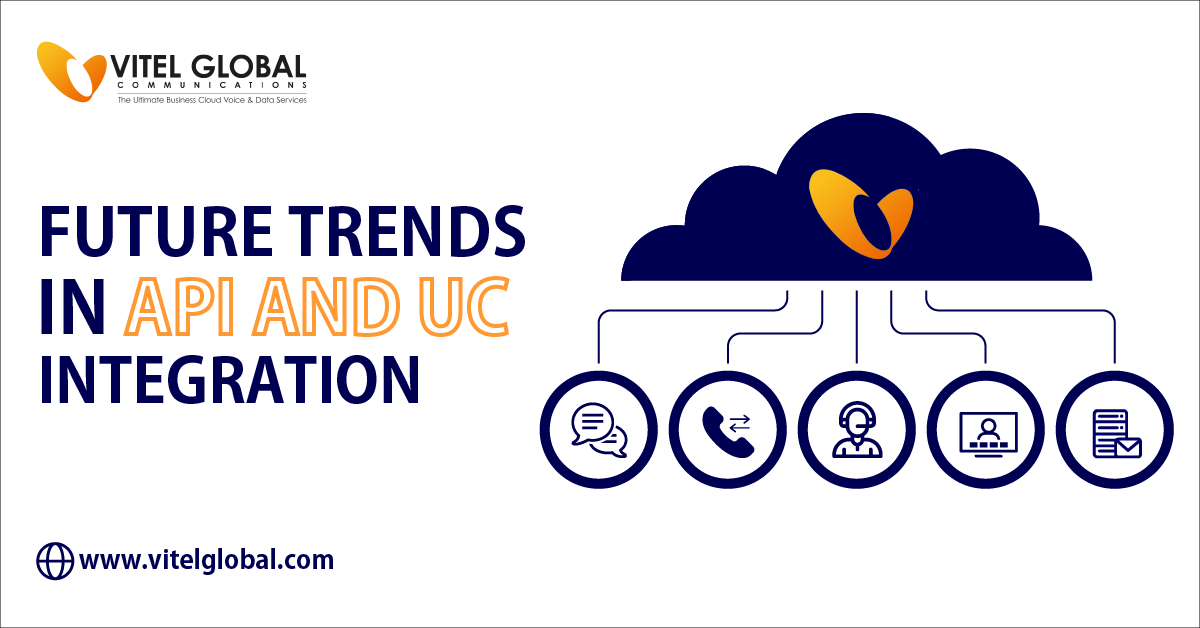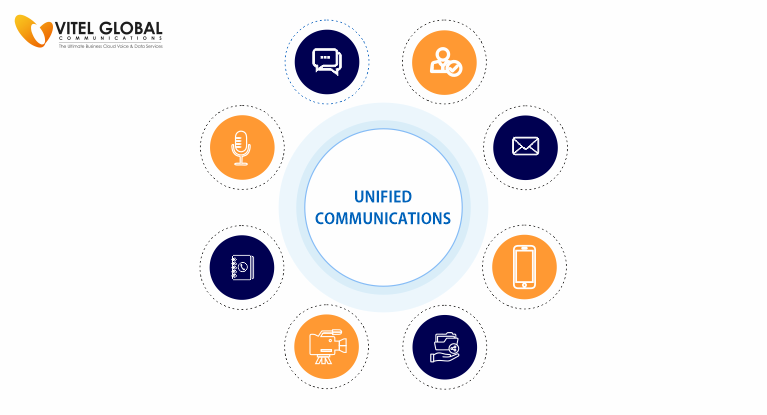Comparing UCaaS and CPaaS: Key Differences and Benefits

7 min read
For every organization to succeed in the long term and move forward, it is important to understand the value of business communication services. Internal or external communications of an organization can contribute to the growth and development of any firm. Facilitating proper communication is a primary objective for any management.
Post-pandemic, it is observed that there have been many changes in the work cultures of the company. Hybrid and remote work cultures have been introduced, and most businesses at an early stage follow this culture for better and more effective results. Although such hybrid and remote working environments provide effective results, there are also a few limitations it comes up with.
One of the primary concerns of the management before providing a work-from-home option to their employees is connectivity. It is very significant for all the employees to connect with their teammates regularly to achieve the organizational objectives. Through virtual communication tools like business phone services, unified communications and communication platforms as a service and many more, business communication has become an easy process.
UCaaS
Unified communications as a service is a communication platform or tool which enables business professionals to connect with advanced features. It consists of high-quality calling features like cloud based video conferencing, screen sharing, instant messaging, call recording and many more. These features best suit businesses and can help grow any business.
These features are not designed according to the company profile, making it easily accessible for every company irrespective of its size or industry profile. They can be easily adaptable and do not require additional hardware. Henceforth, we expect many companies shortly to switch to these services.
CPaaS
A cloud-based communication platform as a service helps simplify the regular calling duties of employees with its highly efficient features. They enable companies to access all the features online with the help of the internet. It reduces unnecessary expenses incurred in an organization and does not deal with specific hardware instalments.
CPaaS can include features like instant messaging through SMS, video and teleconferencing, Multi-Media messages and many more. These features can be taught in the existing voip phone service for business to add more value to the services. These services are best suited for companies that have to deal with several inbound and outbound calls daily.
Benefits of CPaaS and UCaaS
Both services provide similar advantages to organizations, with the following features standing out:
- Usability: UCaaS and CPaaS solutions offer a simple, efficient way to stay in touch. You can work with your team without the need for a time-consuming setup.
- Affordable: Cost is, without a doubt, a significant factor in today’s cutthroat economy. Businesses constantly seek methods to reduce costs and boost profits. These systems offer a practical means of controlling workplace cooperation. The firm needs to pay the cost of the service (for a specific time) while using UCaaS. Note that there aren’t any high-cost hardware or software expenses. Businesses pay for the capabilities they utilize with CPaaS, but the pay-as-you-go business strategy can significantly reduce your communications expenditures.
- Obtaining Advanced Functions: Users of both platforms have access to VoIP technologies that can increase their productivity and efficiency. Employees can utilize chatbots to plan meetings and get information fast. For instance, you can use advanced analytics to track client interactions. And they can also use the call recording function to enhance agent training and analyze crucial calls. Businesses can use CPaaS to create unique apps tailored to their particular requirements.
- Outstanding Integrations: Both platforms offer fantastic integrations that increase your app’s usefulness. They provide simple platform-agnostic centralization of client information and communication. Therefore, you are covered whether you want to interface your app with your email system, CRM, or other third-party apps. Else, you can add social logins to it.
- Scalability: Businesses may quickly add extra users and services they need using UCaaS and CPaaS without spending money on expensive hardware. You can access These systems from anywhere since they are cloud-based. These can perform operations to be readily scaled to meet the rising demand for the ideal environment for remote workers. Because of this, UCaaS and CPaaS offer practical and affordable scalability.
- Safety: Security is a primary concern for companies of all sizes in this era, where data breaches are more frequent. And the service providers give a range of security protections to save your data. For instance, many service providers use encryption services to safeguard the data while it is being transmitted and uphold security standards. Security measures such as firewalls and intrusion detection systems help the service provider keep your data secure.
Many providers also provide services like private servers. They let you keep your data out of your hands and have the ability to set up private chat rooms. By this, you can manage who can access your messages if you’re concerned about privacy.

Two Main Differences Between UCaaS And CPaaS
Quality
In UCaaS, the calls do not experience quality interruptions because the system is located in a colocation data centre. The colocation data centre has a large bandwidth capacity. It consists of highly efficient servers and other components that ensure high quality of service. UCaaS also usually offers voice recording and instant messaging, unlike CPaaS, which does not offer these features.
Cost
UCaaS offers more advanced call monitoring and reporting capabilities than CPaaS. UCaaS delivers all the benefits of cloud PBX at a lower cost when compared to having an on-site system since it eliminates the need for telecommunications provider costs, lease fees, and IT support staffing fees, among others.
Integration
- UCaaS makes your entire organization accessible.
- CPaaS creates customized and unique solutions by integrating multiple tools from different providers.
Flexibility
- UCaaS provides flexibility for organizations which helps to add and remove users quickly, like seasonal employees, without any significant changes.
- CPaaS offers the flexibility of setting up communication tools for the business based on the requirements of the organizations.
Security
- UCaaS providers offer built-in authentication measures, ensuring only authorized users can access sensitive data. Advanced access control features, which allow IT administrators to generate the roles for different users within their systems, are also provided by UCaaS so that the employees can only access the resources they need.
- CPaaS: Prioritizing security and privacy protects user data and ensures integrity and availability.
How Can UCaaS Help Your Business?
As discussed, Unified Communications offers several features that make calling and connecting easy. Business communication is vital in every part of the organization, and multiple departments require effective calling services. Here are a few areas where UCaaS can contribute to the maximum growth and development:
CRM Integration
Many companies prefer integrating CRM with business phone services to access several other features. Although UCaaS assists businesses in recording their regular activities, CRM helps them maintain all the collected data. It helps businesses by providing personalized dashboards to guide them through all the tasks. These dashboards interpret information easily and can help present the data accurately.
Simplified Meetings
The meetings section is one of the main sectors where this technological advancement is highly and effectively used. As we know, every manager has to set up several meetings daily to take regular updates, host discussions and many more. Using cloud based video conferencing on this platform, people can set up real-time meetings with groups or individually.
Effective Presentations
Presentations are an important part of every organization. Either to explain to the clients or the internal team members, presenting information in the form of documents can influence the decision a lot. It can help you represent your content more attractively and clearly. It will eliminate the chances of having extra queries or concerns.
How Can CPaaS Help Your Business?
According to our prior understanding of the subject, CPaaS can provide a communication platform for businesses that deal with regular inbound and outbound calls. These businesses can benefit a lot from CPaaS as a service as it can reduce the excess efforts of the employees in an organization. It will also assist in collecting and representing information in a more structured manner.
Location Barriers
Reaching new markets and gaining more customer acquisition is one of the main objectives of many companies. Many companies look for a global presence, but due to location barriers, they limit themselves. But with the help of CPaaS, they can reach outside their boundaries and establish their audience without requiring a physical office presence.
Growth-Oriented
Every company aims to grow their team size and customer base. Over a while, nothing remains the same in the business. With growth, survival becomes easier. Implementing a communication platform for the long term can be a little concerning to business owners. But choosing the right providers will help you scale your services according to your growing needs.
Easy Installments
Installing any technical solution in an organization is a time taking, costly and yet difficult process. But with Communication services like these, there are no tools required. It can be easily deployed, and the employees can use the services quickly. There is no specific hardware required. Hence it reduces the other expenses.
Aligning These Two Together
Both these communication solutions have their own set of advantages and limitations. Although they provide similar services, a few notable differences might impact the businesses. Most businesses prefer to choose both these services together.
Adapting these services in a combined structure can benefit the organization. Both solutions can also be very cost-effective and are still easy to adapt. But companies should be mindful of switching to these services together as they need to use them to the maximum potential. If they do, they may avoid ending up in losses.
Define Your Objectives
An organization should first have clear goals set up. They must understand where and what to work on and why they must use these cloud communication solutions. This information will clearly define what services they must switch to and how much budget is worth investing.
Integration Support and Training
Once you know what kind of services you are installing, it is best to consider how to integrate them. In this scenario, most companies are already well equipped with software that can assist them in integrating and supporting both of these solutions simultaneously.
Employers should provide employees with proper and necessary training to utilize these solutions to their optimum potential. Although the solutions are user-friendly, training and induction can still add value for the employees.
Conclusion
UCaaS and CPaaS are powerful solutions for any business, regardless of company size or field. Staying technologically advanced and utilizing these technology solutions for the betterment of their organization is always important for companies in this competitive market.
Published: February 27th, 2023
Subscribe to Our Latest Updates
Get monthly product and feature updates, the latest industry news, and more!







